Set Up TestNav on Android
Page Currently Not in Use
For information, see TestNav - Android App and Secure Testing
After you download TestNav, complete the setup using the sections below.
During BOTH the infrastructure trial and the actual test, note which specific Android device each student uses during each test. The TestNav app saves SRFs to only one designated place on the testing device. If an error occurs, you can locate files only on that specific device.
Install TestNav
See instructions for managed or unmanaged devices in the sections below.
Depending on your OS version, you will see two prompts either when you install or when you start TestNav for the first time. One prompt requests file access; the other requests microphone access. You must click or tap Allow on both prompts to proceed with testing in kiosk mode. You can see a screenshot for each below.


Install TestNav on Managed Devices
To use TestNav on a managed device, you must first send the app to devices. When you use the steps below to send the app to managed devices, TestNav installs on those devices.
Log in to your Google Play for Education account.
Type TestNav in the search field at the top of the page.
Click on TestNav, and click Install.
Click Continue at the bottom of the screen after reading the information on permissions.
In the Add People field, add the names or email addresses of those you want to access TestNav.
You can also enter a Google Group address or a contact group.Google has also provided tips on sending content on their Send free content to students page.
You can also set up TestNav on Android using a mobile device management (MDM) system that supports Device Owner.
Install TestNav on Unmanaged Devices
To use TestNav on an unmanaged device, on each device:
- Tap the Google Play store app.
- Type TestNav in the search field.
- Click on TestNav, and click Install.
Run App Check
- Click or tap the appropriate icon for your test from the home page to go to the Sign In page.
Click or tap the user drop-down menu, and select App Check.
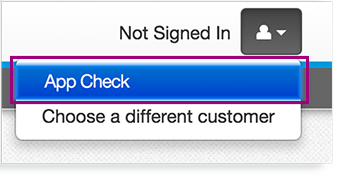
App Check (without optional Configuration Identifier)
On the App Check page:
- Leave the configuration identifier field blank.
Click Run App Check.
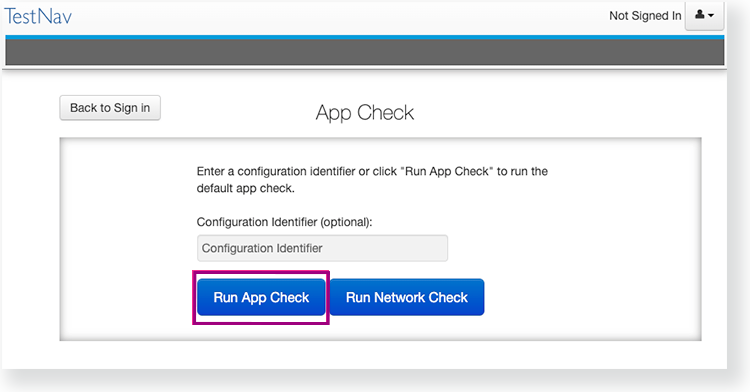
You see green checkboxes for Kiosk Mode Readiness and connectivity to TestNav, if the system passes. If one of these fails, you will see a Fail message and must check your connection and settings before running App Check again.
App Check (with optional Configuration Identifier)
If you have obtained a Configuration Identifier from your assessment management system:
Enter it in the Configuration Identifier field.
The configuration identifier allows TestNav to also check connection to ProctorCache computers.
Click Run App Check.
If ProctorCache connectivity fails, TestNav provides information for possible resolutions. Use this information to troubleshoot, and run App Check again.
Run Network Check
On the App Check page,
Click Run Network Check.
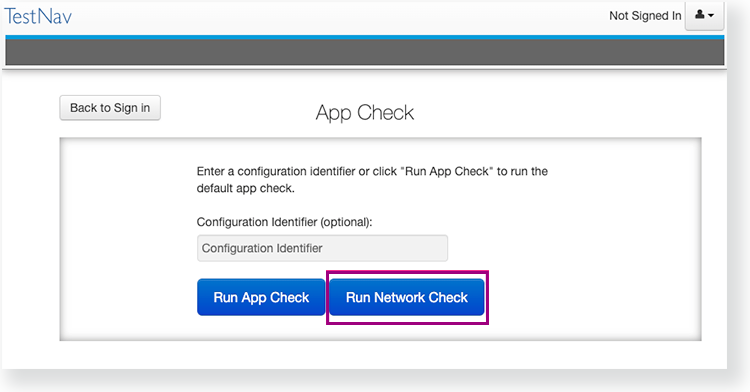
Estimate the number of devices that will connect to your network during testing, and enter it into the Number of devices field.
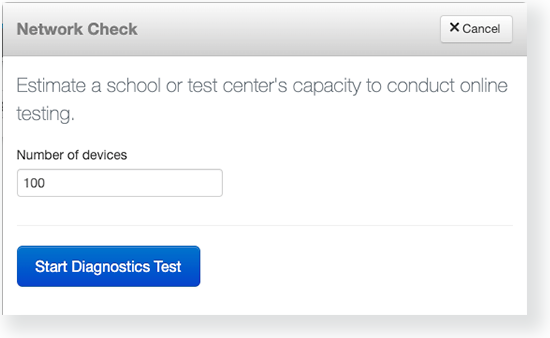
- Click Start Diagnostics Test.
See your Test Results under Network Diagnostics to determine whether your network has sufficient bandwidth to test without ProctorCache.
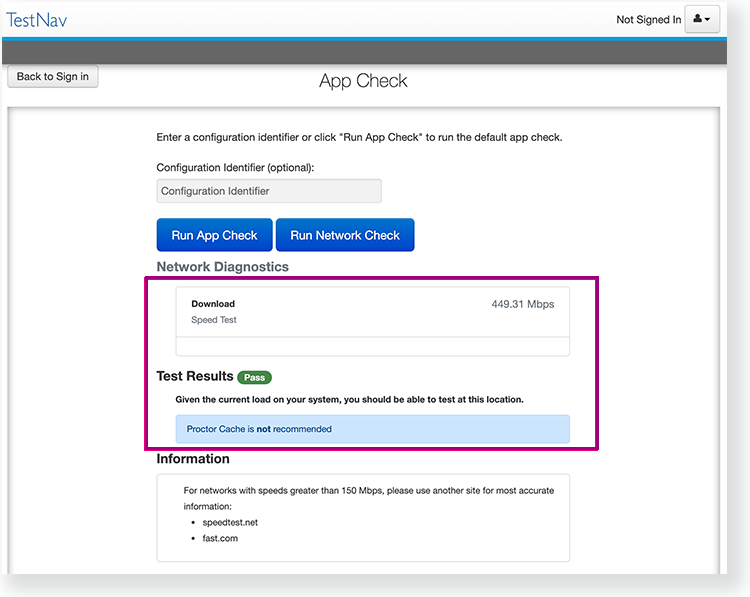
Sign in to TestNav
To start TestNav on Android devices:
Tap TestNav.
If you have not already done so, tap the appropriate icon for your test on the home page. If your test was selected before the test session, you see the Sign In page, rather than the home page.
If you need to select a different test, tap the user drop-down menu at the upper-right of the page, and tap Choose a different customer.
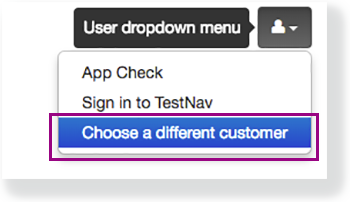
Tap the appropriate icon for your test.

- Start a test to ensure that you can do so without error.
- If you see a Practice Tests link on the Sign in page, tap Practice Tests and start a test.
- If you do not see a Practice Tests link, use an authorization ticket from your student management system and start a test.
Find and Set Up Response File Backups
SFTP configuration is not supported by all assessment management systems. Consult your assessment management system user guide to determine whether the SFTP option is available.
Familiarize yourself with the default primary save location.
Configure the secondary save location through your assessment management system.
The same secondary save location applies to all computers and devices. You only need to set this configuration one time.Communicate SRF and log file locations/procedures to proctors (see Primary Save Location below).
Note which student tests on which device during infrastructure trials and on test days.
Primary Save Location
On Android devices, the SRF default primary save location is NOT customizable.
| You can find SRF and log files on Android devices on computers running either Windows or Mac OS X. | |
|---|---|
| Windows |
|
| Mac OS X | To transfer files, you must install Android File Transfer on the computer. Android File Transfer is compatible with Mac OS X 10.5 or later and Android 3.0 or later.
|
Run an Infrastructure Trial
Pearson strongly recommends running an infrastructure trial to verify the technology setup is complete and to familiarize teachers and students with the test. Use your training site through your assessment management system to complete the trial before the actual test day.
Related Information
You can learn more about SRF and log files on the Set Up and Use TestNav page.